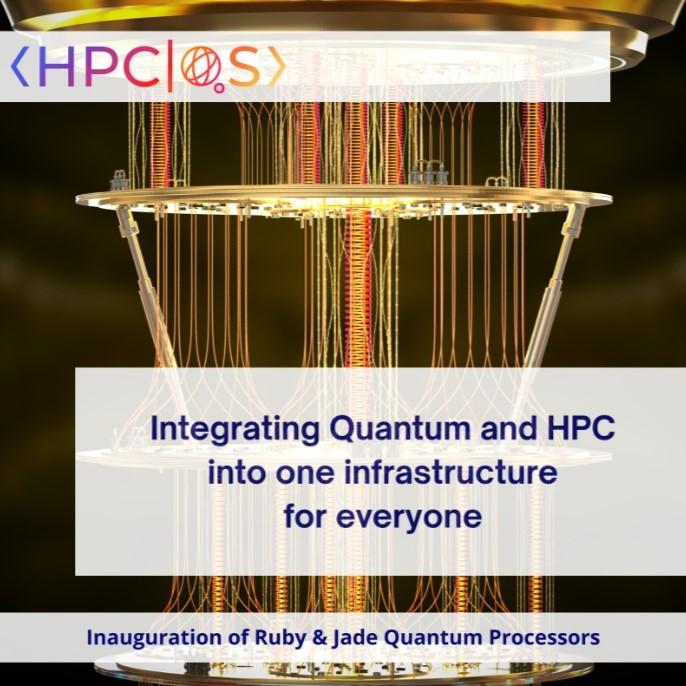
The successful integration of the two next-generation quantum processors into high-performance computing (HPC) environments, an achievement made possible by EuroHPC Joint Undertaking, marks a decisive step toward making quantum computing a practical component of Europe’s scientific and industrial computational landscape. Moreover, it delivers on the ambition set out by the European Commission in the 2030 Digital Compass: the European way for the Digital Decade, proposing that, by 2025, Europe will have its first computer with quantum acceleration paving the way for Europe to be at the cutting edge of quantum capabilities by 2030.
On November 13th, the quantum processors Jade and Ruby are being jointly inaugurated in a triplex event at Forschungszentrum Jülich (FZJ) in Germany , Commissariat à l’énergie atomique et aux énergies alternatives (CEA) in France and the European Commission’s premises in Belgium, reflecting the collaborative nature of the project. In the course of the event, the two processors, situated respectively at Jülich Supercomputing Centre (JSC) in Germany and at Très Grand Centre de Calcul (TGCC) in France will be presented.
Hardware Integration: Quantum Computing Capabilities for HPC Infrastructure
The integration of the two quantum processors represents significant progress in transforming quantum technology from laboratory experiments into reliable computing infrastructure. This integration will provide a key step towards a federated EuroHPC quantum–HPC infrastructure, enabling users from both industry and research to develop hybrid quantum–classical algorithms and tackle complex problems such as industrial battery design, drug discovery, and optimisation challenges in finance and traffic management.
The quantum processing units (QPUs) were prefabricated by the company Pasqal before being shipped to the data centres of CEA and FZJ. Pasqal's technology is based on arrays of neutral atoms that are trapped and manipulated by lasers in programmable geometries for quantum operations. These systems operate at room temperature and with low power consumption, making them particularly robust and scalable.
The combination of optical precision and naturally identical atoms creates a unique platform designed for quantum computing on an industrial scale.
Software and Connectivity: Seamless Quantum-Classical Integration
Beyond the hardware assembly, the integration also focuses on achieving a seamless quantum-classical workflow through advanced software solutions.
The quantum processors are integrated into the HPC environment through standard workload management systems such as SLURM, enabling hybrid quantum-classical computations to run using familiar commands. This ensures that researchers and HPC operators can leverage quantum computing power with minimal adaptation, turning quantum into a natural extension of classical infrastructure.
A specific HPC-Quantum Computing software stack was developed by the consortium, relying on industrial and open-source software components. By bridging the gap between quantum physics and real-world computation, the HPCQS infrastructure will enable quantum resources to be directly embedded in industrial workflows.
European Leadership in Quantum Computing
“Today marks an important milestone for European research. We are entering a new phase in which quantum and classical computing begin to evolve together. This is more than a technical achievement – it signals a new paradigm for computation, one that will shape the future of scientific discovery.”
Kristel Michielsen, Director of the Jülich Supercomputing Centre and HPCQS Project Coordinator
As part of the inauguration, two use cases are being demonstrated to showcase the integration of the two quantum processors, each capable of controlling more than 100 qubits, with Europe’s Tier-0 supercomputers. These demonstrations, led by research teams from across the consortium, will show how quantum-HPC integration can accelerate scientific discovery and industrial innovation.
This milestone represents a cornerstone of Europe’s Quantum Flagship initiative, reinforcing European leadership and technological sovereignty in the field of quantum computing. By linking quantum processors directly to Europe’s supercomputers, we are turning an ambitious scientific vision into a working reality.
About HPCQS
The High-Performance Computing Quantum Simulator hybrid (HPCQS) project brings together leading research centres and industry partners from across Europe to pioneer hybrid quantum–classical computing.
HPCQS aims to build a federated hybrid quantum-HPC infrastructure, integrating Pasqal's quantum simulators directly with Europe’s top supercomputing centres, such as CEA and FZJ.
The HPCQS Project is funded by the European High-Performance Computing Joint Undertaking (JU). The JU receives support from the European Union’s Horizon 2020 research and innovation programme and Germany, France, Italy, Ireland, Austria and Spain in equal parts.
About EuroHPC Joint Undertaking (EuroHPC JU)
The EuroHPC JU is a legal and funding entity that brings together the European Union and participating countries to coordinate efforts and pool resources with the objective of making Europe a world leader in supercomputing.
To equip Europe with a cutting-edge supercomputing infrastructure, the EuroHPC JU is deploying supercomputers, as well as quantum computers and AI Factories across the continent. European scientists and users from the public sector and industry can benefit from these EuroHPC systems through the EuroHPC Access Calls , regardless of their location in Europe, to advance science and support the development of applications with industrial, scientific, and societal relevance.
The EuroHPC JU also funds research and innovation projects to develop a full European supercomputing supply chain, from processors and software to applications to be run on these supercomputers and know-how to develop strong European HPC expertise.
Details
- Publication date
- 13 November 2025
- Author
- European High-Performance Computing Joint Undertaking